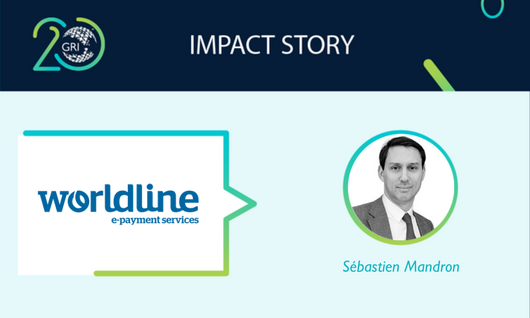Case Study: Sustainability Reporting Creates a Virtuous Circle

The French-based e-payment services company Wordline started sustainability reporting in 2014, using the GRI G4 Guidelines, and is now one of the pioneers to publish a GRI Standards report. We talked to Sébastien Mandron, Corporate Social Responsibility Officer at Worldline, about how sustainability reporting helps the company enhance trust with its stakeholders.
Sébastien Mandron: Sustainability reporting enables Worldline to monitor and therefore improve its extra-financial performance, by giving an overview not only of the current information we report but also of our action plans and their results. For us, sustainability reporting represents the bridge between our financial and extra-financial strategy.
What role does sustainability reporting play in how Worldline conducts business?
Sustainability reporting is a virtuous circle. On the one hand, it improves our credibility with target audiences, raises awareness among employees and stimulates actions in favor of CSR. For instance, by reporting greenhouse gas emissions and related information, we have set up action plans to reduce the environmental impacts of our buildings and data centers.
On the other hand, reporting helps us to better monitor our objectives about value creation for our clients, by producing sustainable products and services. Encouraged by the KPI “sustainable revenue generated”, Worldline strives to develop sustainable initiatives, such as the Donation Box contactless payment solution, or the Voice-over POS terminal, which aims to ease the payment process for disabled people – an idea proposed directly by our employees.
How has Worldline benefited from reporting using the GRI framework and being a member of the GOLD Community?
Thanks to the GRI framework, we have the tools to define what is material for us in terms of extra-financial topics, and thus to define our corporate social strategy and deliver an overview of our performance. Following the GRI framework means that Worldline can provide extensive environmental, social and governance data, facilitating the identification of key information and decision-making among our stakeholders. As a member of the GRI GOLD Community, Worldline demonstrates its support for GRI's mission of empowering decision-makers everywhere. The membership also helps us capture key information, especially regarding the implementation of the new GRI Standards, and provides special support in our transition and implementation of the GRI Standards. This is made possible through GRI’s multi-stakeholder network, which keeps us up to speed on the latest trends in extra-financial reporting and best practices.
What are the material sustainability topics for Worldline and how is the company using reporting to address negative impacts?
Worldline’s materiality is defined based on the GRI Standards and business-specific topics. These include Economic Performance, Market Presence, Indirect Economic Impacts, Procurement Practices, Energy, Emissions, Training and Education, Employment and Diversity and Equal Opportunities, among others. These material topics were also the basis of our TRUST 2020 program. For instance, on the material topic ¨Training and Education¨, Worldline has engaged its staff, resulting in 90% employee satisfaction rating for trainings. On the material topic ¨Employment and Diversity¨, Worldline is committed to eliminating its gender gap in managerial positions by 2020. Finally, with ¨Indirect Economic Impacts¨ Worldline has committed to increasing revenue and creating value for its clients through innovative and sustainable solutions.
The GRI Standards also help us identify and quantify the actual negative impacts that we have on the environment, for example. Based on this, we have launched various action plans to address these impacts, including a program to offset carbon emissions.
Worldline is vocal about the importance of maintaining stakeholder trust. How does sustainability reporting help Worldline do this?
For Worldline, our materiality analysis and the resulting sustainability report are the basis for creating a strong stakeholder dialogue. Worldline’s approach towards stakeholder dialogue is developed in conformity with the principles of inclusivity, materiality and responsiveness as defined in the AA1000 standard by AccountAbility.
Within Worldline’s business context, data protection and service availability represent a critical point for stakeholders, and sustainability reporting helps us share detailed information on the challenge of building client trust with fully available and secured platforms. Finally, reporting provides stakeholders with transparency, comparability, timeliness, reliability and clarity of information. Therefore, GRI Standards help enhance trust.
As part of the TRUST 2020 initiative, Worldline has committed to offsetting all CO2 emissions by 2020. How do you plan to do this and what role do the GRI Standards play in helping you accomplish this goal?
One of Worldline’s main ambitions of its program TRUST 2020 is to offset 100% of the CO2 emissions linked to the production of its payment terminals, data centers, offices and business travels. Already in 2016, all CO2 emissions linked to our payment terminals and data centers have been offset. This is possible thanks to the carbon offset program launched in 2012, allowing us to declare that Worldline provides carbon neutral services due to our renewable energy investment in India. The GRI Standards provide Worldline with a dashboard, delivering a clear evolution on emissions, energy consumption and energies used for production. It is a crucial tool that allows us to have a full overview on our environmental performance and on the key areas we need to focus on.
With the GRI Sustainability Reporting Standards, companies are able to unlock the transformative power of transparency, while contributing to the common sustainability agenda and reaping the benefits of increased stakeholder trust. Visit the GRI 20th Anniversary hub for more impact stories, and join the effort to create a sustainable global economy.

